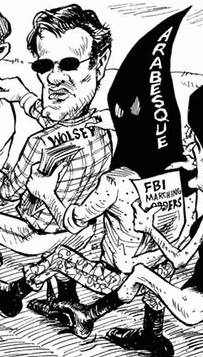George Washington on Disinformation:
The topic of disinformation is a very complicated one. Essays, lengthy papers and whole treatises have been written on the subject. But the very length of most discussions overwhelms people, so that they never get an accurate picture of what disinformation looks like.Part II, The 5 Goals of Disinformation by George Washington:
So I thought I'd take a crack at a very simple definition of disinformation, something that is short enough to read in two minutes.
Disinformation is:
* Repeating the same false claims over and over even when people have proven that such claims are contrary to the evidence (for example, the claim that no planes hit the Twin Towers)
* Spending more energy causing in-fighting and disruptions then helping to promote the truth, and causing dedicated activists to waste time rebutting obviously false claims and theories
* Unnecessarily alienating large sections of the population by attacking victims' families, certain religious or ethnic groups, or political parties with no reason
* Calling someone names instead of addressing that person's theories or claimed facts
* Making knowingly false statements about someone
* Threatening people or their families with violence, job loss, or other forms of intimidation or harassment
* Acting as provocateurs to disrupt peaceful groups or gatherings
People who repeatedly do one of the above things even after people have pointed out what they are doing, are spreading disinformation -- consciously or unconsciously. Indeed, because disinformation may be an unconscious activity, I prefer to call it "disruption". These actions disrupt the ability to spread 9/11 truth and to obtain justice against all of those who carried out the attack.
No matter how much seemingly good 9/11 truth work someone has done in the past, if someone starts causing more disruption than good, than he or she should not be followed any more. This is especially true if people have pointed out that person's disruptive behavior, but he or she has carried on disrupting 9/11 truth work anyway.
The 5 goals of infiltrators of the 9/11 truth movement (or any movement challenging fascism) are to: Distract, Disrupt, Divide, Discredit and Derail.
Specifically, avoid people whose actions mainly have the effect of:
* Distracting, disrupting, or derailing 9/11 truth efforts;
* Dividing the truth movement; or
* Discrediting leading 9/11 activists
To remember this list, just think of "the 5 D's of Disinformation".
Part III, If It Quacks Like A Duck... by George Washington:
For more on Disinformation:9/11 activists spend a lot of time trying to figure out who is a government "disinformation agent" and who is not.
I would argue that it is a total a waste of time.
If someone is being disruptive, and seems to pursuing one of the 5 goals of disinformation, then he or she is causing problems and should be avoided or at least not given a megaphone. It doesn't matter what the motivation is: whether ego, confusion, or a government paycheck.
Sure, some people might want to understand someone's motivations to know whether or not to give them a second chance. That's fine.
But if it quacks like a duck, its probably a duck. Its a waste of time to try to figure out why it quacks, or whether its a mandarin duck or a mallard. Just treat it like a duck.
9/11 Truth Leader on Disinformation and Infiltration
Articles by Arabesque:
9/11 Disinformation and Misinformation: Definitions and Examples
9/11 Truth and Division: Disinformation, Agent Provocateurs, and False Adversaries
